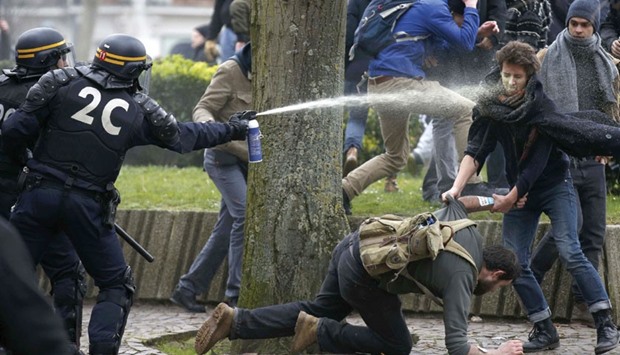
French gendarmes use tear gas during clashes with youths in Lille during a protest yesterday by employees, high school and university students against the French labour law reform proposal.
Hundreds of thousands of workers and high-school students joined protest marches across France yesterday to challenge plans to loosen the country’s protective labour laws that unions say favour businesses.
The day of protest – which led to scores of arrests as youths and police clashed in Paris, Lyon and Nantes – marked the fourth such test of strength in a month for President Francois Hollande.
He has been plagued by low popularity and a jobless rate that is stuck stubbornly above 10% little more than a year before a presidential election.
Organisers said more than 1.2mn people took part.
The interior ministry put the number at just under 400,000, higher numbers – despite persistent rain – than in some other recent protests.
The nationwide strike shut the Eiffel Tower, disrupted train services and saw some 200 schools closed or barricaded by students.
Riot police used tear gas against stone-throwing protesters in the western cities of Nantes and Rennes, while around 10 youths were arrested in Paris where demonstrators threw firecrackers and yellow paint at security forces.
The three protests to date had been relatively low-key, but with rail, air traffic and utility staff among those to stop work, there was significant disruption across the country.
Yesterday Reuters TV footage showed hooded youths in Paris jumping on cars, taunting police and throwing projectiles, prompting riot police to charge some groups.
Reuters reporters also witnessed clashes in France’s second city Lyon and in Nantes.
Police arrested more than 100 people and at least 13 officers were injured, the interior ministry said.
Unions said they planned further rallies on April 5 and 9 with the hardline CGT union saying the protests would not end until the draft labour bill was withdrawn entirely.
“Small employees are treated like dirt, we’ve had enough, (and) it’s Hollande who pretends to represent the left,” said Jean-Luc Gutel, a CGT representative who works in the delivery service in Paris. “The youth are told to study for years, but what for?”
State railway SNCF said stoppages among its staff had cut some services by 40-50% yesterday.
About one in five flights were cancelled at Orly airport south of Paris, the DGAC air transport authority said.
French utility EDF said that power output at several production units was cut after nearly 14% of its staff joined rallies.
Under rainy skies, secondary-level school pupils also mobilised in dozens of cities alongside labour unions.
At issue is a proposed overhaul of France’s labour code, a set of regulations bosses claim deters recruitment.
Critics say the reforms will lead to worse working conditions and more sackings.
The reforms, due to be debated in parliament next week, would give employers more flexibility to agree in-house deals with employees on working time.
After Communist lawmakers brandished signs in the Senate demanding the withdrawal of the text, Prime Minister Manuel Valls said many had a “distorted” view of the reform.
“We have already lifted a number of concerns,” he said. “The door remains open ... to work this out for companies, workers and the youth of this country.”
The protests come a day after Hollande, who has said he will not run for re-election if he fails to make a dent in the jobless rate, abandoned another piece of legislation – plans to strip convicted terrorists of French citizenship.
That climbdown was forced on him by other lawmakers, many of them in his own camp.
Hollande’s government watered down the initial labour reform proposal shortly before it was unveiled this month by ditching a clause that would have capped severance pay awards.
Economists fault the French system for creating a divide between older people with open-ended work contracts and first-timers condemned to move between short-term jobs.
Joblessness is nearer to 25% among the young.
Some reform-minded unions have backed the changes, but the unions behind yesterday’s protests said in a statement: “Clearly, this bill will not lead to the necessary job creation, will make insecurity more widespread and will deepen professional inequality, notably for women and youths.”
A recent opinion poll found 58% of the public still opposed the labour reform bill.
A video of an officer punching a 15-year-old boy on the sidelines of a protest last week went viral and fuelled further anger.
The officer was detained for questioning yesterday.
